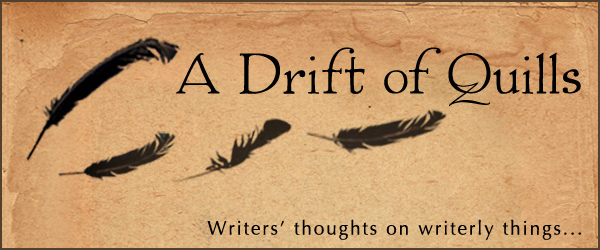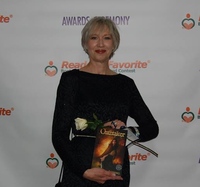
Today is the latest edition of flash fiction Friday. This morning I finished tweaking the story while my boys shot at me with their various weapons, whooped and hollered, scalped me, and then climbed over, on and under my chair. You know, the usual.
But now here we are, and our group of writers have chosen an image and we have written a short story from the same picture. As usual they are incredibly interesting and wildly different. Check out what we’ve found…
 Parker Broaddus
Parker Broaddus
Author of A Hero’s Curse & Nightrage Rising
The Trickster Guardian
When Gregus first took the idea to imitate his master, it had been as a joke. At least, that’s what he later said.
It happened like this.
Braxton Seerguard was the powerful, yet reclusive, forest guardian of Runewood, tasked with keeping the road passable from Bear Pass to the Sparkling Hills. When an invitation came from the Cantonwoods Clan to attend the chieftain summit, Seerguard growled his displeasure. He was getting older, and liked an evening at home–not one playing wild games with the clans. He asked Gregus–his assistant, servant, apprentice, or pain in the neck–depending on who answered, to attend in his stead. So you could argue that Seerguard’s downfall was really his own doing. Had he been less reclusive, and more engaged with the inhabitants of his region, perhaps Runewood would still be free, and the light of the White Tower would not have turned dark.
But, it just so happened that the Cantonwoods Clan had never met the forest guardian. Which is what sparked Gregus’ plan–all for a laugh, of course. When he arrived at the chieftain summit the servant bowed low and cleverly introduced himself, with much flowery language and the recounting of many deeds, as the representative of the forest guardian of Runewood. Except, somehow or another, the “representative” language was hurriedly mumbled. Or perhaps missed altogether. The Cantonwoods Clan and their chieftains clapped Gregus on the back and thrust the enormous  clan stone in his arms, and roared with laughter as he staggered and fell over. Then the festivities began. They were numerous, lively, all involving some show of skill, and tied to long tradition. One example suffices. It was a test for the strongest members of the various clans. The contestants took the aforementioned clan stone, a monster of rock that required both arms to hold properly, and hurled it as far as they could from a set point. “This is the measure of the clan’s loyalty, strength and ugliness!” shouted the contest’s caller, and the crowd hooted with laughter and appreciation. One giant of knotted muscle and shaggy hair hurled the stone with one arm, was disqualified for overstepping the line, and promptly re-qualified as the caller went sailing through the air after the stone.
clan stone in his arms, and roared with laughter as he staggered and fell over. Then the festivities began. They were numerous, lively, all involving some show of skill, and tied to long tradition. One example suffices. It was a test for the strongest members of the various clans. The contestants took the aforementioned clan stone, a monster of rock that required both arms to hold properly, and hurled it as far as they could from a set point. “This is the measure of the clan’s loyalty, strength and ugliness!” shouted the contest’s caller, and the crowd hooted with laughter and appreciation. One giant of knotted muscle and shaggy hair hurled the stone with one arm, was disqualified for overstepping the line, and promptly re-qualified as the caller went sailing through the air after the stone.
It was an rowdy and exciting time, but not unusual, and might have slipped into history without any notice except for this–Braxton Seerguard’s description, manner and presence had subtly changed. Without knowing, without meaning, the Cantonwoods Clan spread a slightly different version of the forest guardian. If you didn’t know the end, you might not have even noticed, or thought it important. But for any leafing back through histories, interviewing those who were present at the beginning–there weren’t many left–concurred that it was at the chieftain summit the ruse began.
The forest guardian made one other mistake, perhaps more deadly than being overly fond of quiet days and long evenings: he did not appreciate the cleverness, or tenacity, of his servant. He dismissed him as lazy, or even foolish. Which only fueled Gregus’ imagination.
And as we all know, a reckless imagination can be a dangerous thing.
Years later, when Brandy Thumpton was captured by the Red Guard and taken to the fortress of Vandar Sul, (this was before he became known as the Black Cape, and the first time he escaped Vandar Sul), he met Gregus. The former servant had of course by then assumed his master’s name and become Braxton Seerguard, forest guardian of Runewood. He sat in a chair in front of a roaring fire, full of ill-gotten power and the confidence that comes from knowing that even the lowest mouse who knew his secret would squeak no more.
Brandy Thumpton had only a few memories of the old forest guardian, from when he was a child, but he was the first to have seen the two, make the connection, and make it publicly known that this new Braxton Seerguard was an impostor. But that only happened after he leapt from the wall into a giant oak and escaped into the forest, avoiding the dogs by never touching the ground, moving from tree to tree all the way to the river. (That was what prompted Gregus to cut down the forest surrounding Vandar Sul).
And so the joke played on, but with only one laughing.
 Robin Lythgoe
Robin Lythgoe
Author of As the Crow Flies
The Sword of Seysan
Let me tell you a story. I was chosen as the Royal Companion to Seysan, the younger prince of our fair country, on account of my virtual nothingness and my possible usefulness. My insignificance came firstly from having no genealogical claim on the throne, and secondly through the persuasion of the king’s good friend, the Master of the Hunt.
My usefulness needed demonstration, but performing secretarial duties for the prince and protecting him from distraction or annoyance didn’t prove terribly challenging. I learned to dance, sing, ride, paint, and play a decent game of cards. In all other things I must be expertly unexceptional and perfectly neutral. A balm. A pet to sooth the so-called savage sovereign. Faugh.
Amid this perfectly normal, perfectly dull process of coming of age and adulthood, things went decidedly south…
 Patricia Reding
Patricia Reding
Author of Oathtaker
Breaking Spells
Aiden Piper journeyed from the Burara Wilds back home, where six years earlier, Fenella’s father, Nigel Duke, had forced Finn Mock to put a spell on him. It happened the day before he and Fenella were to exchange their vows in the cobblestone-paved Dorberg village square. As a consequence, Aiden and his love would remain divided until they broke Finn’s spell. But Nigel, taking no chances, had paid crimpers to trick Aiden, drug him, and then . . .
Thanks for following along! Please let me know on Facebook what you thought of The Trickster Guardian, or shoot me an email, or send me a carrier pigeon. I’m always eager to engage! Also, a special thanks to artist Pete Mohrbacher (DeviantArt) for letting us use the painting – you can check out more here.

 Of course, all of that is in between the work outside – cleaning up after the last snowstorm, building a new shed in the back yard, working at the office, and negotiating the purchase of one of the historical buildings downtown. Built in the late 19th century, the old building is a stately brick two story, with a lot of work to be done. It’s an exciting thing to get to take a historical treasure of that type and get to be the primary force involved in restoring and conserving it.
Of course, all of that is in between the work outside – cleaning up after the last snowstorm, building a new shed in the back yard, working at the office, and negotiating the purchase of one of the historical buildings downtown. Built in the late 19th century, the old building is a stately brick two story, with a lot of work to be done. It’s an exciting thing to get to take a historical treasure of that type and get to be the primary force involved in restoring and conserving it.





